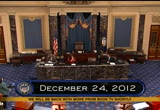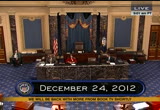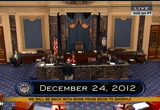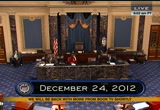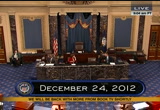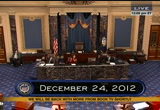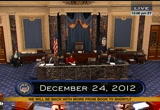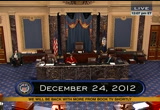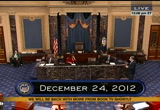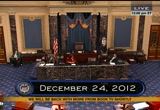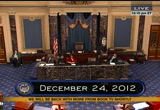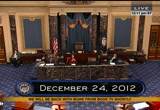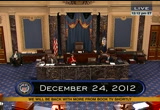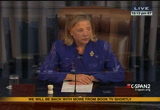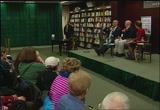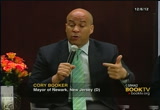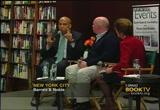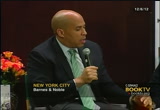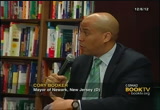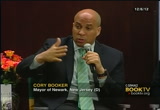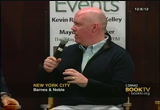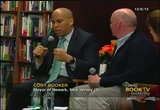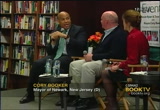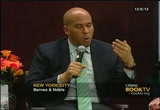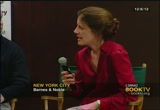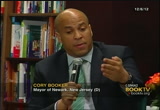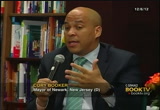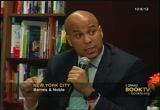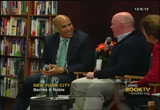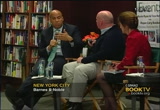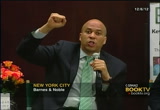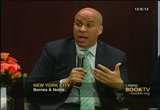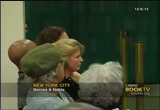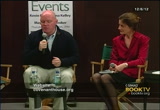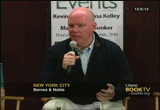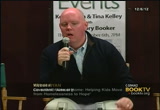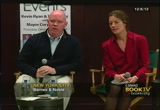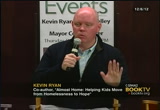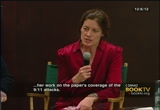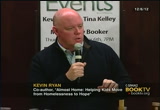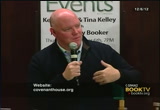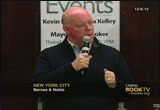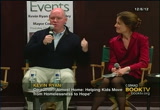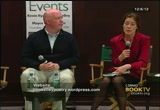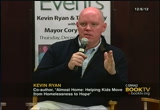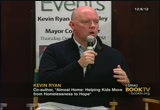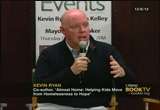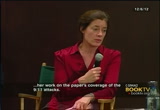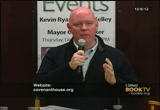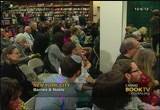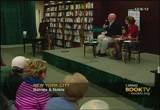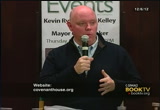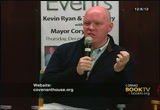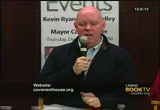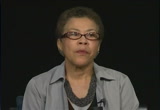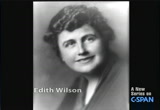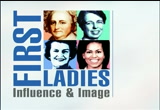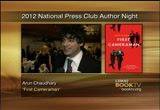tv Book TV CSPAN December 24, 2012 12:00pm-1:00pm EST
12:08 pm
>> we're expecting the senate to come in here for a brief pro forma session. senators are back for legislative business on thursday or and will come in the at 10 a.m. eastern for work on two bills. the first would extend provisions of the foreign intelligence surveillance act exprk the over is a $60 billion relief package for areas affected by hurricane sandy. and negotiations on the fiscal cliff continue and debate on a deal is possible in either the house or the senate once it's announced.
12:10 pm
>> the senate is running a little bit behind schedule. senators were expected back in for a brief pro forma session about ten minutes ago at noon eastern time. in the meantime, a look ahead to tomorrow morning's "washington journal." a look at the biggest foreign policy events of 2012, our guest is ely lake of news week and the daily beast. then the biggest political stories of 2012. we'll look at that with juan williams. "washington journal" starts every morning at 7 eastern on c-span.
12:13 pm
>> as we wait for this pro forma session to get under way, some information about programming happening the day after christmas. c-span spoke with two retiring lawmakers, congressman dan burton and senator kent conrad. mr. burton, an indiana republican, served in congress for 30 years, and in the 1990s chaired the house oversight committee. senator conrad, the north dakota democrat, has been in office for 20 years and chairs the senate budget committee. our interview with congressman burton is at 8 p.m. wednesday night and senator conrad follows at 8:30. the presiding officer: the senate will come to order. the clerk will read a communication to the senate. the clerk: washington, d.c, december 24, 2012. to the senate: under the provisions of rule 1, paragraph 3, of the standing rules of the senate, i hereby appoint the honorable mary l. landrieu, a senator from the
12:14 pm
state of louisiana, to perform the duties of the chair. signed: patrick j. leahy, president pro tempore. the presiding officer: under the previous order, the senate stands adjourned until 10:00 a.m. on thursday, december 27, 2012. >> we're going to go back to our booktv programming now. kevin ryan, president and ceo of covenant house, and tina kelley, former staff writer for "the new york times," talk about their book on teenage homelessness, "almost home." >> some of them making $7 and change an hour. and many of them working overtime to try to make more money but still qualify for programs like s.n.a.p., and so here we are allowing many of our employees -- especially as i was saying behind the curtain. i think the curtain's there to block the sex and love section. [laughter] do you notice that is the one
12:15 pm
that's curtained off here? it's like 7/eleven, so you guys should put your book on the sex aisle. [laughter] it would sell much better. >> we should have called the book "50 shades of homelessness." >> yeah. it would have sold a lot better. >> it would have. >> so the -- you guys have such dirty minds. get out of the gutter. [laughter] but these guys, the poignant testimonies you were telling us because we live in a society where here are front line first responders. these guys tell stories about intervening in petty crime. we had one of the buildings that was targeted by some people who had terroristic intents, and they're on the front lines with this. and yet we can only pay them $7 and change an hour. and they have no benefits, they have no retirement security. one guy was telling me he's worked for ten years, no health care. if he gets sick, he has to try to come to work and work through the sickness. and that's not the america that i think of. and so i'm really hoping this week just to finish the answer,
12:16 pm
the overly-long answer is to, um, really bring more attention to these problems. and right now, this session, congress is going to be debating cuts in the s.n.a.p. program. and in this time of austerity, we can't be dumb and cut things that ultimately provide long-term benefits that are really not -- entitlements, they're really investments in us and our society, and we should begin to prioritize these things federally as well as our actions locally. >> mayor, you were speaking in your forward about the small actions that people took to help your father. we talk in the book quite a bit about the small actions that people take that can help homeless young people. can you talk a little bit about how that works in a city? >> yeah. well, first of all, i've had lots of conversations with people who, quote-unquote, have made it, and when they were in tough times from famous people like tyler perry who was homeless, living in a car, to people i know throughout my community who have got, broken
12:17 pm
drug addictions, who have dealt with brutal, brutal hatred because they came out of the closet at a young age. all these stories. and it's amazing to me that everybody, including tyler perry, has these stories about how one perp's small act of -- one person's small act of kindness was a difference maker for them. and it gives me chills to think that the biggest thing we actually do on any given day probably could be a small act of kindness to someone else. and so the vulnerability and fragility of life you really get to see up close and personal in cities like ours here in new york and ours in newark, new jersey, and how it doesn't take that much effort to be there for a kid. and i see, and i was very happy during sandy, we were able to do some things through covenant house and in cooperation with some extraordinary people that linked in to raise a lot of money because it actually doesn't take that much money to give a person a doorway of hope.
12:18 pm
and the last thing i'll say on this is, you know, for me i get very upset because when i first became mayor, i had a metaphor that i clung to. i used to tell people because i'm such an optimistic, hopeful person, i used to tell people, i'm a prisoner of hope. when we walked through city hall, there were so many challenges, and i'd say we're prisoners of hope. we can do nothing but hope. now seven years later my metaphor's completely changed, because i see things happening in every sector of our city from the largest parks expansion in a century, from a -- in a down housing market, the creativity of my team to double housing. first time newark's population is actually going up. hotels built by newarkers, employing people in our city. i'm hope unhinged. because i now believe in my
12:19 pm
heart of hearts that there is no problem -- poverty, child homelessness -- there's no problem we can't solve. it's not a matter of can we, it's a matter of do we have the collective will. and i'll give you one example with kids that drives me a lot is we have tens of thousands of children, thousands in this metropolitan alone, on waiting lists for big brothers and big sisters. and, now, the data on mentoring is amazing. big brothers, big sisters, the data drives down juvenile crime, drives down early sexual behavior, drives up academic achievement. it's incredible what four hours a month, the amount of time we spend watching our favorite tv shows -- i know in new york you guys watch real housewiveses of new jersey -- [laughter] and jerseylicious, jersey shore, i know you guys do that. [laughter] one tv show begin up for a month, four hours, if we spent
12:20 pm
that time mentoring, imagine what we could do. thank god my father wasn't on a waiting list, there were people in the town. they didn't need a formal program that stepped up and were there for my dad. alice walker said the most common way people give up their power is not recognizing they have it in the first place. we all have the power to make transformative change in kids' lives, transform these outcomes, but often we don't engage or make ourselves aware of programs, organizations that do that every day. >> you know, the book includes stories about people who stepped up, right? a cook can in new orleans -- a cook in post-katrina new orleans who decides she's going to be mother to a whole group of homeless kids who don't have moms, and a business executive in newark. it's filled with adults stepping up to do big and small things, it's also filled with adults who hurt kids and prioritize drugs or their careers or some selfish interest over young people. why do you think some people step up to make a difference in the lives of kids and a lot of
12:21 pm
kids the world wants to go away, right? the world wants to ignore these kids, and other people, you know, find a different path. why is that? >> so i don't know. [laughter] i don't. i don't. because it actually feels so good, it feels so good to do the right thing. and, you know, as much as inner cities people talk about the negative, and it's there, it's under these tough conditions that you see the most beautiful exhibitions of humanity on a daily basis. i see people, i mean, during sandy i was blown away by the extraordinary kindness people were extending to their neighbors. one of my favorite ones that i thought was funny was when i was in a tough neighborhood unloading water and handing it out, and this woman in, disabled woman in a electric wheelchair says i need two cases of water. i'm like, ma'am, i can't give you two cases of water. i said, i need it, my
12:22 pm
neighborhood needs water. let me understand something, you are going to be delivering water in your neighborhood? she goes, yeah, and we checked it out. this woman was riding around on her electric -- she should have been the one we were delivering water, and she was out delivering to 20-somethings who couldn't do something and engage. and so that's the degree of human experience and the expression of humanity. so i don't know what it is, but i do know it's infectious. i do know when you, when somebody does something like that, it inspires other people. why did one picture of a cop giving shoes on the street become a viral photo? why? because we all hunger for that. we crave for it, and we're inspired by it. why do you see an uptick in giving at christmas time and the holidays? because it's an infectious spirit. what we all have to know is that all of us are in every single day we instruct others around us.
12:23 pm
all of us carry this toxin that is kindness in us, and we shouldn't keep it for ourselves. and i'll give you one last example that happened to me. somebody banished my cynicism. it was a snowy day in new york, i was -- had come in here, i was a 20-something just starting in newark, slogging around on this slushy day, and i remember coming to this pool of slush that was deep. it was probably like shin deep. and i was looking at it, and then i see an older african-american woman pushing one of those, um, carts, you know, you guys know what i'm talking about, the metal mesh-type carts, and i'm going to go help this woman, of course, through this slush ocean. and then this guy jumps up, a white, conservatively-dressed guy who at that time i never assumed he would go and just walk into the slush into shoes that were probably my monthly allowance, slushes through the
12:24 pm
shoes -- picks this woman's cart up, brings it over to the side, smiles at the woman, the woman smiles at him, and i just stood there as witness to that, and my whole day was changed. it made me kinder, it made me more open, more accepting, more loving. so you just never know what one small act can do to make that kind of change. and that's what this world needs so desperately. because we're stuck. i mean, and you see this. there's no shortage of kids. i want to put covenant house out of business, frankly -- [laughter] because there's no shortage of kids right now that are in need, and that shouldn't be the case. >> so we've talked about the need for political will to help young people. they don't vote, they are not part of a powerful political lobby, and how can we get that message out across on the political sphere? >> well, you know, you get the elected officials you deserve. and they -- and i know this, i'm a politician. they respond to pressure. and they respond to incentives. and unless, so we always push
12:25 pm
the attention to washington or to trenton, albany or city hall, but we can organize. we have the power to exercise pressure, demands, influence on our elected officials. and so we have to get much more active if we're going to have a society that's going to respond to this enduring problem. the rate of child poverty in the united states of america we should be shamed that a nation this strong has child poverty and that kids in poverty don't have the access to success, good education, few traditionally-fit to learn -- nutritionally-fit to learn, materially ready to learn. and that's the lie, or that's the incompleteness that we have to address. that when kids stand up in certain neighborhoods and kids stand up in more affluent neighborhoods and they say those words, liberty and justice for all, when they pledge allegiance to our flag, that that phrase, "liberty and justice for all," should be a command, should be a
12:26 pm
compelling aspiration, and there should be a conscious conviction amongst us to make that real. but right now we are lacking that sense of urgency, and we can't sit around and wait for elected leaders to do it. when i think about great movements in america, i don't really think they were led by elected officials. elected officials were often responding to the pressure or responding to the leadership on the ground, and that's really what we should be doing. when we're thub voting, conversations, debates, how can we have an entire presidential debate, and it seems that the word "poverty" was almost something we shouldn't talk about and we shouldn't address? and so i'm really hoping that we can begin to change the dialogue because i, you know, i'm a guy that actually liked to do a balance sheet analysis of our country. and this is why we have interesting partnerships, the manhattan institute -- which is a new york right-leaning think tank -- is working with us in newark because to me it comes down to a simple balance sheet analysis. s.n.a.p., for example.
12:27 pm
for every dollar spent on s.n.a.p., it creates a multiplier effect in our economy because that money's being spent. it creates about $1 pbts 70 of job creation, of gdp growth. the same thing with programs for kids. you can show direct investments in programs for young people produced as actually a real economic result in the end. so if we just do a balance sheet analysis of things, we'll change. i was campaigning for president obama in seattle and was with a amazing supportive housing organization there that showed they had 23 homeless people that they looked at their medical expenses, um, for the year before they came into their supportive housing and the year after. 23 people, they saved their local hospital a million dollars in medical expenses was we all -- because we all know it's far more expensive to leave somebody, especially if they have a mental health issue and other things, it's far more expensive leaving them on the street than to come in and
12:28 pm
empower them. and this is what the study didn't really do. it talked about medical expenses, but i went to visit some of the residents. i went one man who now was volunteering, who now was teaching people about cooking and making contributions. so we have a backwards way of thinking about this. this is why i think our criminal justice system in america is the most -- if you're a republican, that should b be your biggest cause to go after because it's big, wasteful government. it doesn't need to be that way if we were empowering people to succeed on the front end. >> mayor, we're going to make you late, so i'm going to offer one thought before you check out and give you the last word, and that is -- [inaudible] [inaudible conversations] >> when we first met, i remember saying to you that i liked your tie, and you took that tie off and gave it to me. and i think that you offer that to the country. you offer us your light, and so many of us, 1.2 million on twitter, but lots of folks we can tell you all across the country on the book tour ask us about you, about the light that
12:29 pm
you draw us to, hope, optimism and knowing that the future for this country is bright if we're in it together. i was stumped, by the way, in anchorage when a woman asked me, is he really as sexy as he seems? [laughter] i said -- >> i'm what you call a 40-footer. i look much better from far away. >> but i want to thank you for the light that you shared with us in this book and the light that you bring to the people of newark, but the light that you bring to the nation. because so many of us look to you for hope and optimism, and i think our country's future's bright in part because you're going to be a big part of it. >> i appreciate you saying that, but i will correct you. look, you know, i said this to my staff today. i get a lot of psychic energy from being the mayor of the city, but yet i'm there, there's managers, people who get the job done every single day whose names you never hear about. and i'm very proud to have been able to give a modicum of support to the incredible work that you're doing. but you know that there are
12:30 pm
heroes of light and energy that are working with covenant house in newark that are making transformative changes. there is a young kid one day that's going to be born to one of the children there that you'll never even know their name, generations unborn will feel that love. so that's my challenge to everybody, and science shows this. if you look at the stars tonight, and you live in manhattan, so you probably won't be able to see a star -- [laughter] but just imagine when you look up and see a star, think to yours that a that's -- yourself that that's hundreds of billions of light years away, and many of those stars no longer exist n. the billions of years it's taken for that light to get to you, the star itself is gone. but the energy and light that a body gives off while it's alive goes on forever. it's immutable. people, generations yet unborn feel the warmth and light of that body. that's who we are. we may have a finite time on this earth, but every single day we should be determined to burn as bright, warm and brilliant as
12:31 pm
12:32 pm
of solace and a life of love. so thank you. [applause] >> want to thank the mayor for being with us. we want to take, for a couple of minutes any questions that you may have before we open it up? >> one of my concerns is if you're homeless or poor or middle class or upper middle class how can you go afford to med school at 70,000 grand -- [inaudible] -- with my after-tax dollars. seems to me the government should be doing something to keep tuitions in check. not necessarily turn it into
12:33 pm
a european system but, who are these magical doctors who are going to descend upon america and provide health care to everyday one when it is 70 grand a year for one year of tuition? you have undergrad loans and taking out conceivably 300 grand for medical school? >> for c-span, do we need to repeat the question or are we okay? repeat the question. the question is how are we going to help young people make it through, you know, their educational goals, college or graduate school in light of runaway tuition is that right? >> yeah. >> okay -- >> also provide to the community. >> right. >> how are we going to get the doctors if tuition is 70 grand a year times four? >> we write in the book how hard it is for homeless kids in the city which these young people lived to just get through high school and so the challenge of so many kids confront is and liz mary wrote a beautiful
12:34 pm
memoir last year, breaking night, from journey to homelessness to harvard. she wrote about this. how will we keith educational opportunities for kids for families won't take care of them because you're broken or poor or circumstance of your birth or parents hate them because they're gay or lesbian? these kids are so lost and feel so damaged that college feels like another planet to them. and we write in the book about the game-changing hinge -- things that cities and nonprofits are doing to create high schools connected to homeless youth centers. there is a great program in the city connected to the door, a drop-in center for disconnected youth. it is in hits 41st year. and it i was an amazing program. that school was started with this notion there are young people who are feeling really marginalized and disenfranchised. can you get the kids to come into school if they're
12:35 pm
homeless or struggling? we at covenant house in detroit run three schools are homeless or expelled from the detroit public school system. the public schools are not siphoning the young people, best and brightest kids away from the public school system. these are kids for kids, many way best and brightest rejected from the mainstream public school system and need to find a way back in. there are to the a lot of programs in the united states. we know of just a handful part of a homeless youth program and we think more of that would create real opportunity for kids because, you probably know that if you look at the labor statistics, kids with a high school dip home are much more likely to find employment though unemployment rate is high for young people and much more likely to find work than young people that don't have a high school diploma. getting kids on the bridge to opportunity involves working with high schools and homeless young people.
12:36 pm
young people that are homeless in this city are offering us a master class in invisibility, arrivedding is subway all night long. hanging out in doughnut shops. this is true for all the young people we wrote about in anchorage and new orleans. we have to first acknowledge there are millions of homeless young people in the united states going out of way not to be seen and picked off and understand that if we want to help those kids achieve the great promise of their future we have to recognize they exist and give them love in the world and opportunity in the world for them because they don't have anybody else. >> okay, that's it. other questions? >> my question is, we talked about the government. what about private industry and their support of programs like this? and i know that when i used to work for citigroup, i'm retired now, we had a program where we would have mentoring between our executives and kids in high
12:37 pm
school or junior high school that would help. are you aware, is that in the book or whatever? >> i will start. tina, who did an enormous amount of reporting on this both for "the times" and our book, "almost home" can talk about this as well. the question is what role does private industry play in helping young people who are holmless get ahead? a great example is in st. louis. the panera franchise works with the covenant house in st. louis to create an apprenticeship as part of panera cares to give homeless young people an opportunity to come into a training center intentionally developed to give them the skills in management, in retail, in the operations of that business and launches those young people into management positions. now i'm not talking about minimum wage behind the counter work. i'm talking about a ladder of economic opportunity. there are, the smartest ceos in this country are highering homeless young people. they might not have the resume' of young people who are coming from the best and
12:38 pm
brightest high schools and colleges in the country but they are so hungry. they are, they are so out to achieve, so giving kids that first break, that first job, rite aid in the city, hires many young people at covenant house and gives them opportunity to work and save up for the first apartment and go to school at night. there are a lot of companies that do this. there are not enough. there is real role for corporations and helping young people to move ahead and i think the smartest ceos get that. >> i want to add to that as well about the mentoring efforts that you mentioned. for young people who have been through horrible circumstances sometimes all it takes one person who believes in them 100% and hold them to a higher standard that will take them from being dejected not believing in themselves to flourishing and becoming successful young adults. we've seen over and over again when executives and employees who come into our shelters and pair up within on one with young people to work with them, just having
12:39 pm
someone that cares and believes in their future can be the real game-changer. >> hi. >> how do you change your employees to keep from burning out when they're with people handling hardest human questions? >> that is beautiful question. how do you keep people energized and morale up when they're working with young people who are so oppressed by so much darkness? you know the biggest homeless youth center in the united states of america is just a drive down the road at 41st and 10th before the lincoln tunnel. 250 homeless young people are sleeping there tonight. there are green chimneys, all of these amazing programs here in new york city are taking care of young people who don't have any other opportunities, any other safe place to be and the trafficking and exploitation and the violence so many abused kids have experienced really eats away at the soul of people working every day with young
12:40 pm
people. it was true for me. 20 years ago when i started at covenant house, had a lot more hair, a lot thinner. i forgot who i was. i came to covenant house with a scaffolding of love around me. my mother told me from the day that i could hear that i could sing. i can not sing but my mother had me convinced i could sing. my father had me convinced i would be a really great math and science student. i am not a really great math and science student. but they filled me with promise and encouraged me to believe in myself. so many kids coming into covenant house don't have that, right? you begin to think the darkness is so large and hovers so resonantly that the light is untouchable but the great virtue of covenant house being 40 years old and me having been a part of it for 20 years i now know doctors and teachers and great parents who were once upon a time homeless kids but someone inside or outside covenant house loved them and brought them across
12:41 pm
the bridge from poverty to opportunity. we have to take care of ourselves and remind ourselves and the light, i'm not being sentimental, i really believe this the light is so much stronger than the darkness. we each have to get in this together. big things and small things we can do to help change the life of a kid. there are people in this city who once a we can go down to the shelter and bake a birthday cake for kids who never ever had happy birth did i sung to them before. people write, happy birthday, keisha or happy birthday, marcus, the kids take that down because they never seen their name an happy birthday on a roll. i will sing happy birthday to a kid, changes that kid's life forever. why did that lady come into the shelter to sing happy birthday to me? maybe i'm not broken? maybe something about me is good. if all of us did that, the love, the light that we would shine in the world would be hotter than the sun. i think that's part of this movement of love that we talk about in the book.
12:42 pm
game changing for kids meals all of us getting into this together. yeah? >> [inaudible]. are you talking about the government making investments like mayor booker was talking about? i have a follow-up. >> so the question is are we talking about just volunteerism or talking about the government playing a role? in our book we write about things that we know that the government has to do in order to make a difference in the lives of young people. we talk about the things that individuals have done and can do to make a difference in kids lives. for my purposes if there was one fight that i would like to win and win soon i would like to stop investing billions of dollars in the public child welfare system and have 28,000 kids graduate from foster care every year without a family. so many of those kids end up homeless. they throw their stuff in a black hefty bag and they end up desperate and without any sort of tribe or kin or family to help support them. if we could fix that in our foster care system so within the circle of the public
12:43 pm
sector we could fix that, it would dramatically impact what homelessness looks like in this country. >> and i think it is important to focus on the way we do know ways to fix that system. we have ways of getting kids older and in foster care adopted out. we have ways of getting kids first coming into the foster system into permanent families. we talk in the book about extreme family finding program in st. louis where they have retired detectives trying to find kin from not just mothers and grandmothers and aunts. they will find second cousins and great-aunts and call up and say, would you be interested in giving a home to your relative. 70% of the time with that program they're able it find permanent homes for the young people compared to 40% just under regular procedures. there are a ways to reduce the stream of kids into foster care. there are ways to prevent them from entering the first place providing them with services their families need.
12:44 pm
if we reduce the stream of kids into foster care, then we'll reduce the stream of kids into our homeless shelters because 40% of the kids who graduate out of foster care without a place to go end up homeless within the first four years of their time as young adults. >> there is just one, there is a big, public/private collaboration on the narrative in this country we have to work hard on and that this idea it is still okay to buy and sell kids for the purps of sex. if we could just get half as brave and bold about making it taboo to drive across a bridge or through a tunnel and come into city and buy a kid for a night, if we could be half as successful making that taboo as making smoking we would change people's perceptions what is appropriate in terms of intimacy. there are kids in this city and in every major city in the united states who are being bought and sold. yes on the internet but also by corner pimps and gangs and cartels who make a lot
12:45 pm
of money off the backs of these kids. we have a long way to go in this country talking openly about that and acknowledging young people continue to be exploited and that some boys in this country continue to think it is okay to go into the city for a night and get a hooker. a lot of times that hooker happens to be a homeless kid whose family wouldn't or couldn't take care of her. that is true tonight in this city as well. >> what is, what is does your program specifically do to help kids who are victims the sex trade? >> so the question is, what does covenant house do for kids who are victim of the sex trade? there is both what we do individually with young people and then the public policy questions that we're working to tackle. so first, the latter. we work with other ngo leaders across the country either as participants in, or state-based coalitions, improving, improving legislation that protects survivors of trafficking or the champions,
12:46 pm
anti-trafficking work that is going on at the federal and state level. so in alaska last year the fbi gave covenant house its community partner award for the work we're doing to identify victims of sex trafficking and to work on the prosecution of those who traffic kids. in pennsylvania, several weeks ago, covenant house in philadelphia led a coalition that successfully championed new safe harbor legislation that helps victims of sex trafficking. that would be true throughout the united states and of course in latin america where covenant houseworks in mexico, nicaragua and guatemala. in honduras we work very directly including we coprosecute cases against gangs and cartels trafficking kids as young as 6, 7, 8, programs. the work we do to help victims recover depends where that victim is in terms of their exploitation and their suffering. but it almost always
12:47 pm
involves psychiatric counseling. helping young people begin to deal with rape and exploitation. and help them build a plan forward. that is not very different than the work that we were doing, 30 years ago when kids, we call it trafficking now but it's been going on for a long time. kids have been getting bought and sold in this country for a long time and we've been working helping kids move from exploitation to hope and opportunity. >> another thing we've been advocating for the police forces to be better educated as to when somebody is actually a victim of trafficking and when someone is there on their own volition. so if they determine that someone has been under age or coerced into trafficking, we're urging that police agencies will learn what that looks like and get those kids into services. >> yes, sir? >> is reunification ever a goal? >> the question, is reunification ever a goal? and every opportunity that
12:48 pm
exists for safe reunification and is in a kid's interest it gets explored, right? because we want wherever possible young people to have a family, and if their family is safe, and they can be reconnected to their family, we want to be a part of helping that to happen. just as is the case for younger children in the public child welfare system. i have to tell you that the vast majority of young people coming into covenant house, not just here in new york city, but across the united states do not have families who are interested in or can be safely reconnected to them but that is not true for every young person. whenever it is possible we try hard to work to build the family going forward. help the young person find a group of folks that will love them. we talk a lot about the first job. we talk about the first apartment. we talk about the fact that, kids need to finish their education but the one thing that a young person needs more than anything else is an adult who unconditionally loves them and commits to them and won't let go of them.
12:49 pm
it is what made a difference in my life. the thing that i think you will see in "almost home" that made a difference in these kids lives, people stepped up to be that person the cook in new orleans. as tina often says, it is not the executive direct or or the president or of the charity but the janitor, cook, mentor comes into the shelter who decides i'm not letting go of this kid and i will help that kid get across that bridge. maybe two more questions. then we'll conclude. if there are anymore? yes? hi. >> [inaudible]. thank you for the work that you do. my question actually, we heard about ways adult can help but are there ways youth can help, the homeless group. i went to stewart academy in newark and other high schools that have meant toring programs or perhaps like volunteer programs, of course may be precarious to
12:50 pm
have them working with the youth coming out of covenant house but are there difficult avenues that can be opened up so that youth can work with the homeless? >> right. >> i know that for the holidays we often have young people come in for parties. we can have them do cookie decorating or pumpkin carving, things that people in the shelters have never had. at furs appears very childish but they haven't had those experiences and they love it. i used go down to the shelter and paint people's nails. something that simple, that act of caring that made them feel valued and made them realize people outside of shelter system cared for them. i don't know about being a full-time volunteer if there are age limits on that. >> i think in many covenant houses there are age limits with respect to young person can come into the shelter to help the kids. there are cool things going on in colleges across the country and high schools across the united states in the last several weeks. young people are sleeping
12:51 pm
out to raise awareness about the crisis of youth homelessness and asked friends and family to help raise money to support not just covenant house but other charities working with homeless young people. there are young people from colleges and universities going in and organizing clothing rooms. there are a couple of way you can do a clothing room at shelter, right? you can throw clothes in a pile and say go pick something. you can recognize a sacred moment to get a kid to feel special and organize it like a boutique. you can make it feel like a really special opportunity. even though this young person has not another thing to wear, and this is sad moment for them, people who come into the our covenant houses including a teen doing this tonight in anchorage, are planning ways to make that experience of going into a clothing room and finding a pair of jeans or t-shirt or coat for the winter and turn that into something really special. and young people do that. often high school students will do that. come in and clean the clothes and hang the clothes. there are some ways. covenant house will touch 56,000 homeless young people
12:52 pm
this year in six countries. there will be tonight 2,000 young people sleeping under a covenant house roof. we are part of a much bigger movement across the united states of homeless shelters for kids where we try to put love in the world. there is room for all of us to get involved. last question? >> how can we get involved as adults, not just being kids or so? like here in new york city, how can we help you? >> so the question is, and i promise you i didn't plant this question but thank you so much for asking this question, how can you help us at covenant house? first as i tried to say earlier they're fabulous nonprofits in new york city doing great work with homeless young people. with covenant house at 4st and 10th and we have program for homeless teen moms at 52 shd lnd and 9th. 2300 people will be sleeping under our roof at covenant house. we have volunteers helping
12:53 pm
us. ashley is in the back of the room, waving to you all. everybody see ashley? okay. now that was planted. and if anybody is interested in finding out more about covenant house and volunteering it could be in big and small ways ashley will be happy to provide you with more information. think about this, right? i mean, there's an opportunity here for all of us to do something. maybe it's not inside covenant house though i hope for many of you it will be. maybe you will find a way in your neighborhood and community to reach out to the kid where something seems not quite right? reach out to that young person. it could really make a huge difference in their lives. i'm confident, and there's a huge, huge role for the government to play here. there is also a huge role for us to play here. i'm confident that if we all together get in this and in a robust way and ways that cory was talking about, that, you know, this book, which is about six extraordinary people who
12:54 pm
help six extraordinary kids across the bridge can get exponentially replicated. last thought. >> i would well come anyone in to participate in that work. we need tutors. we need job trainers. we need people to help with resume's. we need people to do small things and big things as well. so i hope you read chapter 8, which is all about what you can do to help after you read these stories. and join in the movement. >> thank you all so much. [applause] >> is there a nonfiction ought shore boo you would like to see on booktv? send us an e-mail. at booktv.org or twitter on
12:55 pm
slash booktv. >> if we turn away from the needs of others we align ourselves with those forces which are bringing about this suffering. >> the white house is a bully pulpit and you ought to take advantage of it. >> obesity in this country is nothing short of a public health crisis. >> had little antennas that went up and told me when somebody had their own agenda. >> so much influence in the office. it would be a shame to waste it. >> i think they serve as a window on the past to what was going on with american women. >> she becomes the chief confidante. she is really in a way the only one in the world he can trust. >> many of the women that were first ladies they were writers, journalists. they wrote books. >> they are in many cases quite frankly more interesting as human beings
12:56 pm
than their husband, if only because they are not first and foremost defined and consequently limited by political ambition. >> dolly was a both socially adept and politically savvy. >> dolly madison loved every minute of it. mrs. monroe hated it, absolutely hated it. >> she warned her husband, you can't rule without including what women want and what women have to contribute. >> during the statement you are a little breathless and there was too much looking down and i think it was a little too fast, not enough change of pace. >> yes, ma'am. >> is probably the most tragic of all of our first ladies. they never should have married. >> she later wrote in her memoir, i, myself, never made any decisions. i only decided what was important and when to present it to my husband. now you stop and think about
12:57 pm
how much power that is, it's a lot of power. >> prior to this battle against cancer is to fight the fear that accompanies the disease. >> she transformed the way we look at these bugaboos and made it possible for countless people to survive and to flourish as a result. i don't know how many presidents realistically have that kind of impact on the way we live our lives. >> just you can walking around the white house ground i am constantly reminded about all of the people who have lived there before and particularly all of the women. >> first ladies, influence and image. a new series on c-span, produced in cooperation with the white house historical association, starting presidents' day, february
12:58 pm
18th. >> you're watching 48 hours of nonfiction authors and books on c-span2's booktv. >> booktv here at the annual national press club author's night and joining us now is author aran chatri. he has written a book called first cameraman. what is your association with the obama campaign and president obama? >> i was his first videographer which is something i carried through the first 2 1/2 years of the white house. this last cycle did not work on campaign formally or the white house. i worked in the world of murky world of super pacs and pacs and expenditures. >> talk to us about the campaign in 2008? how did you get hooked up with the president? >> there was ad in craig's list. that is not the case. right place and right time.
12:59 pm
a friend of mind was working at cnn as documentary producer. that is more normal task in politics. as much as i was interested i was fiction filmmaker, not really first on anyone's list. she knew i was passionate about politics and wanted to get involved and hit it off with the senator and traveling inside the bubble. >> how long did you do it? was it 24/7 for you for a while? >> you know, especially on the campaign it really felt like 24/7. i was practically living in chicago when i was there about two or three days a month. so it was pretty 24/7 but actually scaled back a little bit at the white house because president is someone who values things like having dinner with his daughters and family. around dinnertime i could have pretty reasonable chance he would go off to do family stuff. >> who has all the video? >> all the video is at the white house. very interesting it call goes into the archives where none of it is alloed
137 Views
IN COLLECTIONS
CSPAN2 Television Archive
Television Archive  Television Archive News Search Service
Television Archive News Search Service 
Uploaded by TV Archive on

 Live Music Archive
Live Music Archive Librivox Free Audio
Librivox Free Audio Metropolitan Museum
Metropolitan Museum Cleveland Museum of Art
Cleveland Museum of Art Internet Arcade
Internet Arcade Console Living Room
Console Living Room Books to Borrow
Books to Borrow Open Library
Open Library TV News
TV News Understanding 9/11
Understanding 9/11
